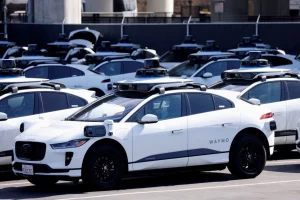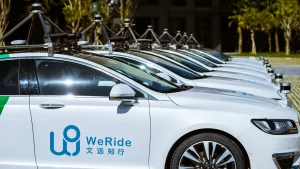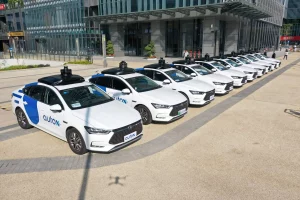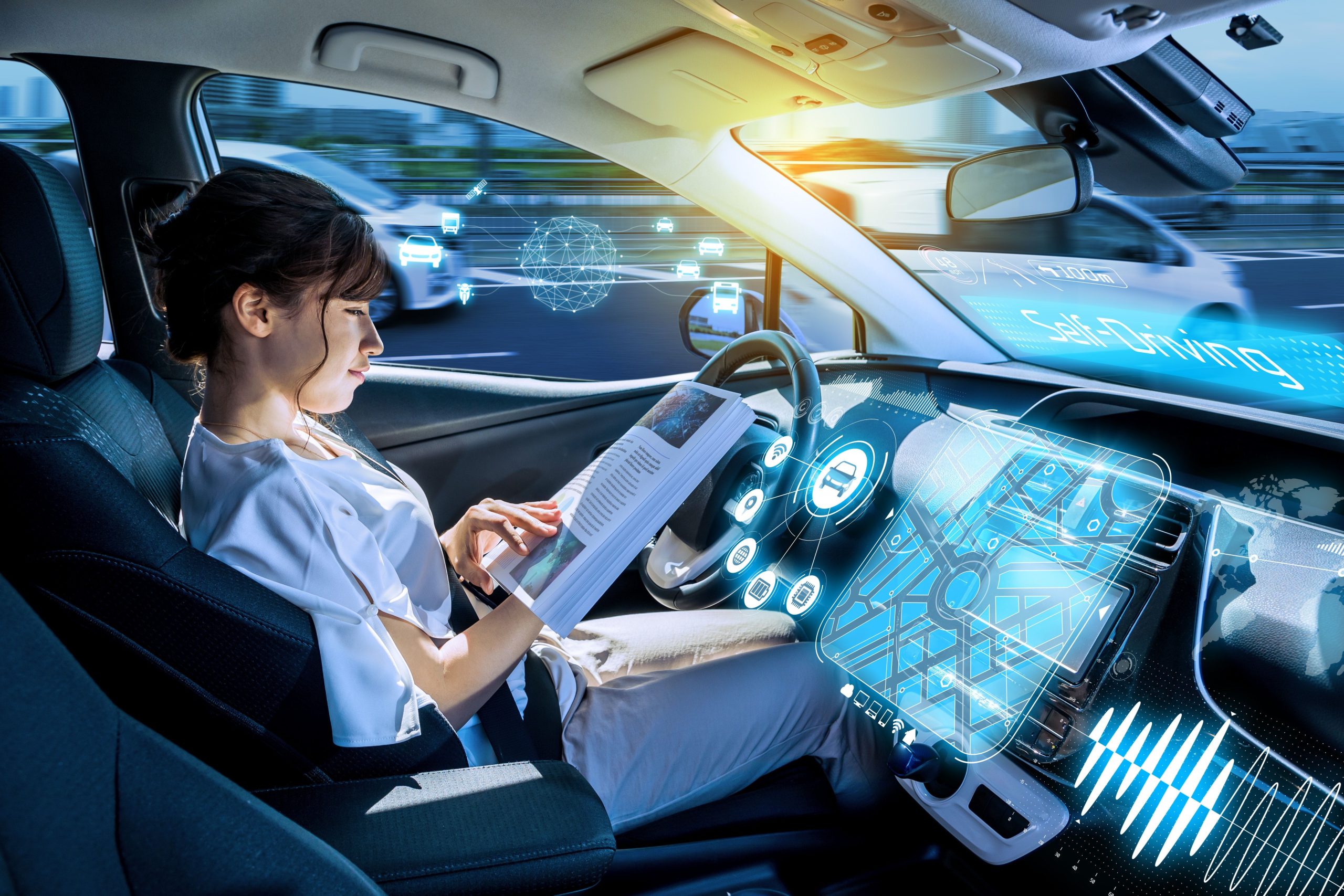In 2024, AI-powered autonomous vehicles are transforming the landscape of transportation. Leading the charge are Tesla, Waymo, and Baidu, with each company contributing significant advancements in the realm of self-driving technology. These vehicles rely on artificial intelligence (AI) and deep learning to drive innovation, safety, and real-time decision-making, providing unprecedented convenience and efficiency in urban mobility and logistics.
Key Developments in AI-Powered Autonomous Vehicles

The year 2024 has seen several key breakthroughs in autonomous vehicle technology, particularly in self-driving cars and driverless taxis. Companies like Tesla, Waymo, and Baidu have taken center stage, each implementing unique solutions and innovations.
Tesla’s Autopilot and Full Self-Driving Technology
Tesla, the leader in electric vehicles, has been at the forefront of AI autonomous vehicles for years. In 2024, the company’s Autopilot and Full Self-Driving (FSD) systems continue to evolve, utilizing deep learning to improve automation features such as adaptive cruise control, lane centering, and self-parking vehicles.
Tesla’s FSD technology has made strides in enabling cars to handle most driving tasks autonomously. From highway driving to city streets, Tesla Autopilot employs advanced neural networks and sensors to ensure precise navigation. This is particularly useful in high-traffic areas where safety is a top concern.
Example: A Tesla driver in Los Angeles relied heavily on the Full Self-Driving technology during a busy commute. The car handled lane changes, turns, and stoplights while the driver monitored the system, only intervening when necessary. This showed Tesla’s growing capability to provide almost complete autonomy in daily driving situations, drastically reducing the need for human input.
Waymo’s Driverless Taxis: Setting New Standards for Urban Mobility

Waymo, owned by Alphabet, has been a game-changer in the driverless car industry, particularly with its Waymo One service. In cities like Phoenix and San Francisco, Waymo One offers driverless taxi rides to the public, proving the reliability of fully autonomous transportation in urban environments. Unlike Tesla, Waymo’s vehicles are designed for a completely driverless experience, requiring no human presence behind the wheel.
This advancement in urban mobility highlights how AI can enhance transportation by improving safety and reducing congestion. Waymo’s vehicles rely on AI-driven sensors and cameras to navigate complex city environments, and they have already completed millions of miles in real-world driving conditions.
Example: In Phoenix, Waymo’s driverless taxis have provided over 100,000 rides to paying customers since launching. Passengers have praised the service for its safety, reliability, and ease of use. Waymo’s extensive testing and real-world deployment have made it a benchmark in the autonomous driving industry.
Baidu’s Apollo Go: China’s Autonomous Taxi Revolution
In China, Baidu’s Apollo Go is revolutionizing transportation with fully autonomous taxis in several cities. Apollo Go uses AI to provide a safe, efficient, and completely driverless experience for passengers. Baidu has made great strides in real-time decision-making, ensuring that vehicles can react swiftly to changes in traffic conditions or unexpected obstacles.
By 2024, Apollo Go has expanded to serve millions of people, making China a leader in the adoption of autonomous taxis. Baidu’s technology focuses on safety features, including AI-powered sensors that monitor the road and surrounding environment to avoid collisions and ensure smooth rides.
Example: In Beijing, Apollo Go now operates in densely populated areas, providing fully autonomous taxi services to the public. In one case, a passenger reported that despite heavy rain and challenging road conditions, the AI-driven vehicle navigated safely through the city without requiring any intervention. This demonstrates the ability of Baidu’s AI systems to function efficiently even in adverse weather conditions.
The Benefits of AI-Powered Autonomous Vehicles

The rapid growth of AI autonomous vehicles comes with numerous benefits that extend beyond just convenience. These vehicles have the potential to transform the entire transportation ecosystem, from personal commuting to logistics. Let’s dive into some key advantages:
1. Improved Safety
Safety is one of the most significant advantages of AI in autonomous vehicles. AI systems, particularly those utilizing deep learning, can process vast amounts of data in real-time, making quick decisions that reduce human error—the leading cause of road accidents. Autonomous vehicles are designed to follow traffic rules strictly, maintain safe distances from other vehicles, and react to potential hazards faster than human drivers.
Example: Tesla’s Autopilot system has been shown to reduce accidents by utilizing AI for emergency braking, collision avoidance, and lane-keeping. These features allow the vehicle to predict potential crashes and take action faster than a human driver could.
2. Enhanced Efficiency in Urban Mobility
AI enables driverless taxis like those from Waymo and Baidu to optimize routes, reducing travel time and fuel consumption. AI algorithms analyze real-time traffic data and road conditions, allowing vehicles to take the most efficient paths. This reduces congestion in cities and makes transportation systems more reliable.
Example: Waymo’s driverless taxi service in San Francisco has significantly reduced traffic congestion in busy areas. By using AI to monitor traffic flow and predict optimal routes, Waymo vehicles contribute to smoother traffic patterns.
3. Reduced Traffic Congestion
AI’s ability to manage multiple autonomous vehicles on the road contributes to a reduction in traffic jams. Autonomous vehicles communicate with each other and with infrastructure (such as smart traffic lights), creating a coordinated system that minimizes stop-and-go traffic.
4. Environmental Benefits
Autonomous vehicles are often electric or hybrid, contributing to a reduction in greenhouse gas emissions. Furthermore, AI ensures optimal driving patterns that minimize unnecessary acceleration and braking, which leads to fuel efficiency.
Example: Tesla’s fleet of AI-powered autonomous electric vehicles is helping to lower carbon emissions, especially in urban areas. By reducing reliance on gasoline and promoting cleaner driving habits, Tesla is making a positive environmental impact.
5. Convenience and Accessibility
For many people, the convenience of AI autonomous vehicles lies in their ability to eliminate the need for human driving. Individuals who are unable to drive due to age or disabilities can greatly benefit from autonomous vehicles, as they can access transportation without requiring assistance.
Example: A case in Phoenix revealed how Waymo’s autonomous taxi service provided a convenient transportation solution for elderly citizens, offering door-to-door service without the need for them to drive or rely on public transport.
How AI is Reshaping Logistics and Delivery
While AI-powered autonomous vehicles are making waves in urban mobility, their potential to revolutionize logistics is equally impressive. Companies are exploring how autonomous trucks and delivery vans can enhance last-mile delivery and freight transportation.
Autonomous Delivery Vehicles

AI systems can optimize delivery routes, reduce downtime, and ensure efficient deliveries. With companies like Nuro and Amazon testing autonomous delivery services, the logistics industry could soon see faster, more reliable deliveries without the need for human drivers.
Autonomous Freight Trucks
The deployment of autonomous freight trucks could significantly reduce transportation costs for businesses. AI can analyze traffic conditions, weather patterns, and fuel consumption, ensuring that goods are delivered efficiently. Autonomous trucks can also operate 24/7, further enhancing delivery times and reducing the need for long-haul truck drivers.
Example: Waymo partnered with logistics company J.B. Hunt to pilot autonomous trucking. The AI-powered trucks delivered goods across long distances, demonstrating the feasibility of autonomous logistics. The project showed a significant reduction in fuel costs and travel time, making it an appealing solution for future freight operations.
Conclusion
As AI autonomous vehicles continue to evolve in 2024, they are shaping the future of transportation. Major companies like Tesla, Waymo, and Baidu are leading the way with groundbreaking advancements in self-driving technology, urban mobility, and logistics. The benefits of these vehicles—from improved safety to reduced traffic congestion—are transforming the way we commute and transport goods.
FAQs
What are AI autonomous vehicles?
AI autonomous vehicles are self-driving cars that use artificial intelligence and sensors to navigate and operate without human intervention.
How does Tesla’s Autopilot work?
Tesla’s Autopilot uses AI and neural networks to automate driving tasks like lane-keeping, adaptive cruise control, and parking.
What is Waymo One?
Waymo One is a driverless taxi service by Alphabet that offers fully autonomous rides in cities




